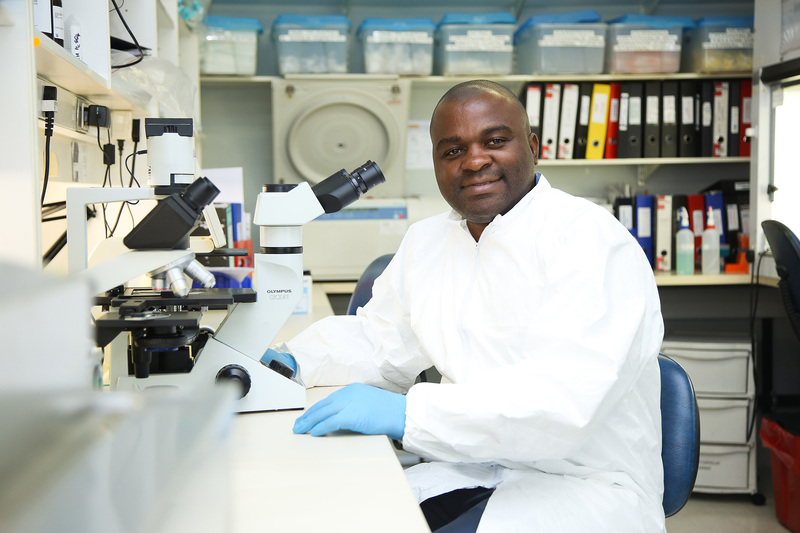Q&A with new Associate Member Dr Muki Shey

Associate Member Dr Muki Shey
Why did you get into research?
I got into research out of curiosity because I was fascinated by being able to discover new things all the time, but most importantly to contribute to ending infectious diseases by developing new vaccines against common infectious diseases such as malaria, tuberculosis and HIV.
Why specialise in infectious disease – what about this field piqued your interest?
Growing up in rural Cameroon people in the community, myself included, would fall sick of malaria every now and then. As a child I also had severe chicken pox, measles and mumps, which then initiated my interest to become a doctor to help these diseases. In high school I was torn between doing engineering and going into the medical field. Luckily my elder brother, who was already a medical doctor, convinced me to get into medicine. So I studied Biochemistry in Cameroon and proceeded to South Africa where I completed my postgraduate degree in immunology and infectious diseases. My focus on TB and HIV is because they are common in South Africa and in my home country – I can make a difference.
What would you like people to know/understand that isn’t necessarily common knowledge about this area of work?
For the new people getting into the field of immunology and infectious diseases it’s a fast moving field with new information and research being released often. You must keep up with current knowledge.
How does your work practically impact society – especially with the advent of the COVID-19 pandemic? How are you balancing your M.tb and related research with COVID-19 work?
My current research aims to understand why, despite sustained occupational exposure, some healthcare workers remain uninfected or resist infection with M.tb, particularly focusing on cellular and genetic factors related to mucosal associated invariant T (MAIT cells) and other cell types. The hope is that if we find a correlate of protection or resistance, this could contribute towards developing new vaccines against TB to boost or replace BCG [Bacillus Calmette–Guérin, a TB vaccine] that has been used for the past 100 years with variable efficacy and no known correlate of protection.
COVID-19 has had a negative impact on my research resulting in extensive loss of recruitment time due to lockdown. But looking on the brighter side, I incorporated COVID-19 into my main research to investigate how this effects immune responses to M.tb among healthcare workers. In addition I have also been looking at T cell responses to new COVID-19 vaccines that are being tested in South Africa, as well as investigating the factors influencing uptake or refusal (vaccine hesitancy) of COVID-19 vaccines by healthcare workers.
Practically – what does this accolade of becoming an Associate Member, mean for your work?
Becoming an Associate Member of the IDM will be mutually beneficial and will assist me in having greater access to the world-class research facility in the IDM as well as increase my collaboration with other members of the IDM community
What do you hope to achieve, career-wise, in the long term?
My hope is to directly contribute, however big or small, to developing vaccines and other therapeutics against infectious diseases, particularly TB. As I grow in my career I want to train and mentor other young researchers to help them fulfil their research dreams in whatever field they choose.
What do you enjoy about your work?
I enjoy discovering new things or doing things that no-one in the world has done before. Everytime I attend a graduation ceremony of my student, I feel fulfilled that I have made a difference in somebody’s life. Also when I go back home at the end of the day and I am able to explain to my little kids what I did for the day and when they ooh and aah, it’s a possible sign that they have understood. Then I feel fulfilled.
Advice to early-career researchers looking to follow in similar footsteps?
Young researchers should find what they are passionate about and pursue it. It might be difficult along the way especially in research, where we depend on funding for both salary and research costs, but your passion will always see you through.
One for the kids: Explain what you do to a five-year old:
I have a 9-year, a 5-year and 3-year old who ask too many questions about what I do and everything else. My answer is usually that I look into people’s blood to see if there are germs in there that make them sick. I then try to find medicine to make them well or even better – to never to fall sick again.
Read more about Muki here.
